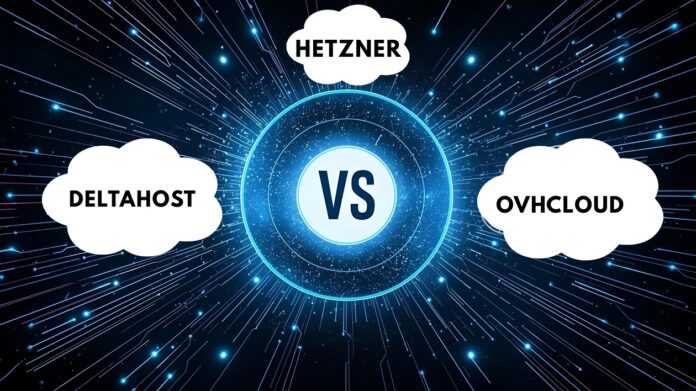Choosing a hosting provider is more than just a technical formality; it is a strategic partnership that can define the future of a digital project. It is akin to selecting a co-founder for a digital venture—the relationship requires reliability, transparency, and the capacity to scale without compromise. In this report, three prominent players in the European hosting landscape are put to the test: DeltaHost, Hetzner, and OVHcloud. The following analysis will move past the marketing collateral to uncover the tangible value, performance, and peace of mind each provider offers.
The Contenders: Who Are They, Really?
Before diving into the numbers and specs, it is crucial to understand the distinct philosophies that drive each company. Each contender brings a unique approach to the ring, shaped by their history, market position, and target audience.
Hetzner: The German King of No-Nonsense Performance
Hetzner, founded in Germany in 1997, has built a reputation on a simple, yet powerful, principle: deliver raw, unmanaged computing power at an exceptionally low cost. As one of Europe’s largest data center operators, the company owns and operates its own high-tech facilities in Nuremberg and Falkenstein, Germany, as well as in Helsinki, Finland, and has expanded its presence to the United States (Ashburn, Virginia, and Hillsboro, Oregon) and Singapore. This direct ownership of its physical infrastructure is a core element of its business model. By controlling the entire stack from the data center floor to the hardware, Hetzner can bypass the costs associated with third-party providers, directly translating into highly competitive prices. This model appeals to a specific type of customer: the technically proficient user—the developer, the sysadmin, the startup founder—who is comfortable with a do-it-yourself approach and values lean, unmanaged compute over extensive hand-holding.
OVHcloud: The Global Giant with a Portfolio for All
OVHcloud, a French company established in 1999, is a global powerhouse and a leading cloud provider in Europe, boasting over 400,000 servers spread across 43 data centers on four continents. The company’s strength lies in its expansive and diverse portfolio, which spans from the ultra-affordable
Kimsufi and Rise servers to enterprise-grade High Grade solutions with dual power supplies and hot-swap disks. This vast ecosystem allows OVHcloud to serve a wide range of customers, from small personal projects to large-scale, mission-critical operations. However, this portfolio-driven approach has a significant drawback. According to user feedback, the sheer variety of products and services has led to a complex and “muddled” user interface that is not intuitive to navigate. Documentation is often described as “bloated and overwhelming,” and simple tasks, such as retrieving an invoice, can take an unreasonable amount of time. This complexity is a direct consequence of the company’s rapid, large-scale expansion; a broader product range requires an exceptionally well-designed user experience to remain usable, and many users claim OVHcloud’s UI falls short.
DeltaHost: The US Specialist on the Rise
DeltaHost presents itself as a more focused, customer-centric player in the hosting market. It offers a range of services, including dedicated servers and VPS hosting, with server locations in Ukraine, the Netherlands, Germany, and the USA. Unlike the automated, mass-market strategies of the larger providers, DeltaHost’s model appears to lean toward a more personal, hands-on approach. The company prides itself on a focus on “reliability, stability, and security” and is geared toward specific use cases, such as online shops, Forex traders, and remote work environments. This commitment is exemplified by its advertised 24/7 support with a promised response time of just 5-15 minutes. This rapid response time is a direct counter-narrative to the notoriously slow ticket systems of some larger providers, suggesting a business model that prioritizes a responsive, human-centered service over the raw, unmanaged scale of its competitors.
Round 1: Raw Specs and Unfiltered Pricing
A side-by-side comparison of the hardware and price tags reveals the core value proposition of each provider, but the real story lies in what these numbers represent and the hidden costs that often go unnoticed.
The VPS Arena: More Than Just Numbers
OVHcloud has recently entered the market with new VPS plans that are highly competitive. A VPS-1 plan offers 4 vCores, 8 GB of RAM, and 75 GB of NVMe SSD storage for a starting price of $4.20 per month. This plan includes daily backups and unlimited bandwidth, offering substantial value. Hetzner, while often praised for its ultra-low prices, provides a
CAX11 ARM-based VPS for as little as $3.9 per month, though its non-ARM alternatives tend to be priced higher. DeltaHost, meanwhile, shows a clear specialization in its pricing, with a
LINUX-4 NVMe VPS (4 GB RAM, 100 GB NVMe) costing $13 per month, while a comparable WINDOWS-4 plan is priced at $23 per month. This pricing difference is a significant factor for users with a specific operating system requirement.
Simply looking at the sticker price, however, can be misleading. User reviews of Hetzner point out that “not all vCores are equal,” implying that the raw numbers on paper may not always translate to the same performance across providers. OVHcloud’s included daily backups and unlimited traffic provide tangible, immediate value that might outweigh a slight price difference from other providers.
| Provider | Plan Name | vCores/CPU | RAM | Storage (Type/Size) | Price per Month |
| DeltaHost | LINUX-4 | 2x Xeon 64bit | 4 GB | 100 GB NVMe | $13 |
| Hetzner | CAX11 (ARM) | 2 cores | 4 GB | 40 GB SSD | ~$3.9 |
| OVHcloud | VPS-1 | 4 vCores | 8 GB | 75 GB NVMe SSD | $4.20 |
Dedicated Server Gladiators: Owning the Hardware
The dedicated server market is where the different philosophies of these providers become most apparent. OVHcloud organizes its Bare Metal servers into distinct tiers that cater to a clear progression of business needs. Its Rise series is positioned as the most affordable entry point, starting at $70 per month. From there, users can scale up to Game, Advance, and Scale servers, which offer increasing levels of performance and reliability features like double power supplies and hot-swap disks.
Hetzner’s approach is more of a “lean compute” model, focusing on raw power at an aggressive price. The entry-level EX44 server starts at €39.00 per month, offering an Intel Core i5 processor and a substantial 64 Gigabyte of DDR4 RAM. These servers are suitable for applications requiring fast and parallel processing. DeltaHost, meanwhile, offers a variety of dedicated server configurations with prices that vary significantly by location. A dedicated server in Ukraine can start at just $52 per month, while a comparable machine in Germany starts at $128 per month. This price difference is a critical consideration for users whose projects have a primary audience in Eastern Europe, as it can offer a significant cost advantage.
| Provider | Server Series | Starting Price | CPU (Model/Cores) | RAM (Starting) | Storage (Starting) |
| DeltaHost | UA Dedicated | From $52/month | Xeon E3-1230v2 (4 cores) | 32 Gigabyte | 250 GB – 32 TB |
| Hetzner | EX44 | €39.00/month | Intel Core i5-13500 (14) | 64 Gigabyte | 2x 512 GB NVMe SSD |
| OVHcloud | Rise | From $70/month | AMD Ryzen™ 7 3700X (8) | 64 Gigabyte | 2x 512 GB NVMe SSD |
The Cost of a “Cheap” Deal: Beyond the Sticker Price
There is a subtle but deeply frustrating aspect of hosting that every expert learns the hard way: the final bill is rarely the same as the advertised sticker price. It is like sitting down at a restaurant, ordering a meal you think is affordable, and then being presented with a receipt that includes hidden surcharges for water, bread, and even the use of a fork. This is the world of hosting fees. Both Hetzner and OVHcloud charge one-time setup fees that can double the cost of the first month’s bill, such as Hetzner’s €39.00 fee for the EX44 server or OVH’s matching $70 installation fee for its RISE-1 server. On top of that, an additional IP address, which is often a necessity for more complex projects, costs $2 per month for both OVHcloud and DeltaHost - https://deltahost.com/dedicated.html.
The real frustration, however, is a widespread user complaint about OVHcloud’s billing system. It is described as “a hopeless dinosaur” and “absolutely garbage”. The experience of waiting five minutes just to download a PDF invoice or being “overcharged” and unable to get a clear answer from support can turn a promisingly low-cost provider into a source of constant irritation. It is a cautionary tale that the cheapest option on a pricing table can become the most expensive in terms of time, effort, and emotional overhead.
Round 2: The Unseen Battle for Your Project’s Lifebloo
The real measure of a hosting provider is not just its price or specifications, but its ability to protect a project when things inevitably go wrong. This is where the battle for your project’s lifeblood is won or lost.
The Digital Guardian: Support and Service Quality
When a server fails, the clock starts ticking. The quality of a provider’s support system directly impacts a project’s downtime and a business’s reputation. Hetzner’s support is frequently praised by users as “wonderful” and “expert,” with qualified data center technicians available 24/7. This human-centric approach to problem-solving is a key differentiator. In contrast, OVHcloud’s support is a recurring source of user frustration. Reviews consistently describe it as “garbage” and “slow,” with some users reporting waiting 3-7 days for a basic ticket response from first-level support staff who appear to be reading from scripts. This is not just a problem with a few bad employees; it is a fundamental consequence of the company’s automated, large-scale model, where a direct, human connection is often lost. DeltaHost positions itself as a strong alternative here, advertising a remarkably fast 5-15 minute response time for its 24/7 support team.
The Fortress or the Floodgate? DDoS Protection
For any project, DDoS protection is a critical service, and this is where the philosophies of Hetzner and OVHcloud diverge most dramatically. OVHcloud includes anti-DDoS protection at no additional cost for all of its VPS plans. The system is designed to automatically detect and put the server’s IP into “mitigation mode” to filter out malicious traffic. This offers a sense of security, particularly for gaming or high-traffic sites, which OVHcloud actively targets.
Hetzner also claims to provide free, automated DDoS protection using sophisticated hardware and filtering technologies. However, user reports reveal a starkly different reality. In the event of a significant DDoS attack, Hetzner’s policy is to “null route” the affected server’s IP address. This means, in essence, that the server is cut off from the network to protect Hetzner’s own infrastructure from collateral damage. It is an effective but brutal solution that takes the server completely offline, affecting both malicious and legitimate traffic. The policy is akin to a bouncer who, instead of dealing with a rowdy guest, just locks the nightclub doors, kicking out every patron—good and bad—to maintain order. This is a critical trade-off to consider: Hetzner prioritizes the stability of its entire network, while OVHcloud’s system attempts to preserve the uptime of the individual server.
The Ground Beneath Your Feet: Reliability and Network
A server’s uptime is only as good as the network and infrastructure supporting it. All three providers claim to offer high uptime, with both Hetzner and DeltaHost guaranteeing a minimum of 99.9% availability. Hetzner, with its robust European network and extensive peering partnerships, is consistently reviewed by users as having solid network performance and low latency.
However, the most definitive event in this category is the catastrophic Strasbourg fire of March 2021, which serves as a cautionary tale for the entire industry. The fire took 3.6 million websites offline and highlighted a significant flaw in OVHcloud’s infrastructure. The company was later found legally liable for over €400,000 in damages to two companies because their backups, which were promised to be in a separate location, were actually stored in the same building as their main servers. This event was not just a simple outage; it exposed a critical single point of failure in their backup strategy and demonstrated a fundamental breach of trust. It is a powerful reminder that true reliability is measured not just in uptime statistics but in a provider’s ability to protect data from worst-case scenarios, and a robust backup plan is not just a feature—it is a legal and moral obligation.
The Ecosystem and the Verdict
The User Experience: Control Panels and Features
The daily user experience is often defined by the control panel. Hetzner is consistently praised for its “clear implementation” and straightforward UI, which aligns with its no-nonsense philosophy. OVHcloud, conversely, receives widespread criticism for its “absolutely garbage” and “muddled” UI, with users lamenting the time spent simply trying to find what they need. DeltaHost provides access to common panels like Hestia CP (free) and cPanel ($33/mon), allowing users to work in a familiar environment.
The Perfect Fit: Ideal Use Cases for Each Provider
After considering all the angles, it is clear that there is no single “best” provider; the optimal choice depends entirely on a project’s unique needs.
- Choose Hetzner if: A project requires raw, unmanaged power and an aggressive price point. This is the ideal choice for a hands-on developer, a startup on a tight budget, or a professional who needs a powerful machine for CPU-intensive tasks, as long as they are prepared to handle DDoS mitigation with an external service like Cloudflare.
- Choose OVHcloud if: A project requires a vast, globally distributed infrastructure, a wide range of services, and robust built-in anti-DDoS protection. OVHcloud is well-suited for gaming companies that need protection from attacks, for enterprises that need a comprehensive product portfolio, or for ventures that can take advantage of the OVHcloud Startup Program.
- Choose DeltaHost if: A project is a small business, a remote work environment, or a Forex trading platform that specifically requires a Windows VPS. It is the perfect fit for users who prioritize a smaller, more personalized, and responsive support experience over the scale and self-service model of the industry giants.
Final Verdict: Your Call, Your Code
In the final analysis, the choice is not about finding the “best” provider in a vacuum, but rather about identifying the one whose strengths perfectly align with a project’s soul. The journey from a great idea to a successful digital product requires more than just code; it demands a solid foundation and a partner you can trust.
So, take this report, dive deep into your project’s priorities, and make a decision that feels right. The servers are ready. The network is waiting. All that is left is for you to build something extraordinary.






